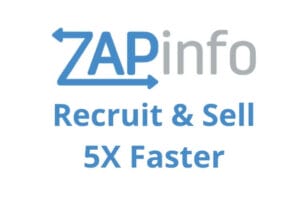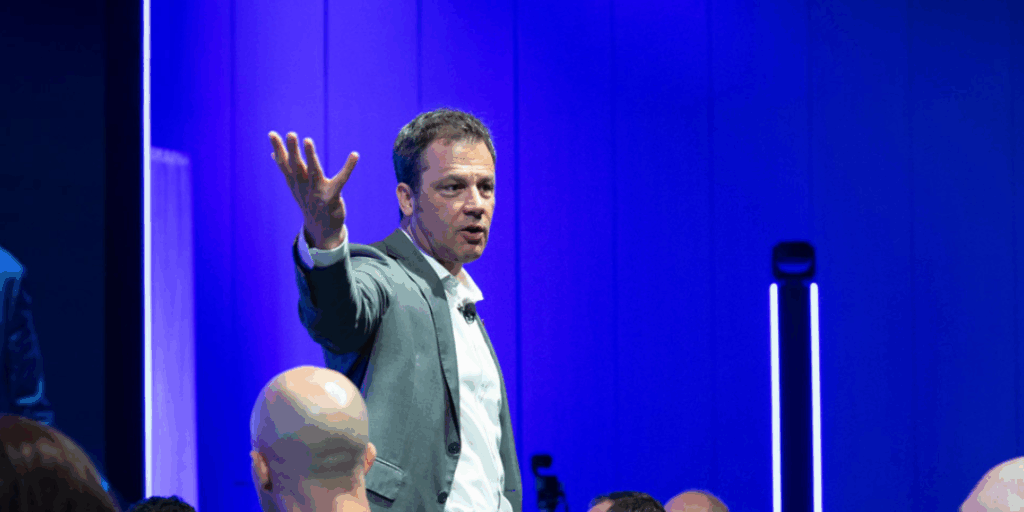
This post is brought to you by ZAPinfo, a recruiting and sales process automation tool that doubles your productivity.
Doug Berg is a college dropout living the entrepreneurial dream. A few years ago he sold his company Jobs2Web for $110 million, and since then he has started a few new ventures and invested in many more. Currently, he’s the “chief zapper” at automation platform ZAPInfo.
Doug and I have been friends for over 20 years, and I had the privilege of supporting him as a channel partner during my corporate days. Riding shotgun on deals afforded me an inside look at the challenge of starting a scaling a business. When I started mine, Doug was one of the first to reach out offering support, advice, partnership and even office space. That phone call meant the world to me. I was going to need it because the adversity, setbacks and sea of challenges associated with starting my own venture were right around the corner.
I learned my own hard lessons for sure. I also learned from Doug that it’s never the setback or adversity that defines you but rather how you respond. Resilience is required, and Doug has that in spades. His ability to recover and redirect his thinking, energy and resources is the stuff of startup legend. It’s been fun to watch and I wasn’t surprised when he crossed the $100 million finish line. He endured the marathon and it was a hard-earned, well-deserved exit.
I wanted to share with my community some of the generous wisdom I have received from Doug over the last couple of decades. While our conversation focused on the entrepreneurial journey there are several pearls of wisdom that move beyond business and into leading a meaningful and fulfilling life. Because true to form Doug isn’t one dimensional. I think he is a far better friend, father, husband and human than he is a tech entrepreneur. I hope you enjoy the highlights of our conversation and Doug’s perspective as much as I did.
Entrepreneurship is a hot topic these days. But we don’t always talk about how difficult that journey is and the sacrifices entrepreneurs make along the way. What was it like for you?
I watch people do it unconsciously, and it can eat up years of their lives. They don’t realize it and see the price that they’re paying. Think about this: Sometimes if you’re too consumed with your idea, you can consume conversations, and then people quietly just don’t want to be around you because you don’t listen to people.
You sold Jobs2Web for $110 million. But before that, you started a business that failed. What did you take away from that experience?
It’s a panic when you’re in a freefall, and yet at the same time, you’re scrambling to do as much as you can to retain your customers and employees. But you also have to make very, very hard decisions about who stays and who goes.
So, we were told on our first massive layoffs not to talk to anybody on the way out. It was a big piece of legal advice — just sit in our office and let everybody leave. But I thought, “No way, man. I asked for these people’s blood — their souls, their energy, their sacrifice — up to this point. I want to stand before them and let them know that ‘Due to conditions beyond our control, unfortunately, we have to make some tough decisions. There’s not anybody in this room I would have liked to have let go. We decided what we decided. I hope your time here has been satisfying, no matter how long it’s been, and I’m here to help carry your stuff out to your car. If I can ever be of value to you, even after you leave here today, I’m going to do everything I can.’ ”
For years after we’ve laid people off, I’ve run into them at Target. I’ve seen them on LinkedIn. They’ve reached out. They want to come back and work with us, because, again, they knew what our commitment level to them was, even in letting them go, and that’s an incredibly important thing. Learn how to honor people, whether you’re handing them an investor check when days were great or you’re handing them a pink slip on the day that they have to get laid off. You can do it honorably either way.
What were things like after you finally folded the business?
I turned my phone off. I went home. I took six months off, and my third daughter was born. Really, Ryan, I had to go through … kind of an exercise.
As an entrepreneur, your ideas always kind of become your identity. You’re promoting them, you’re living for them and you’re driving toward them. Frankly, I had to go through a pretty heavy detachment phase — a crisis of meaning, I like to call it — where I could finally ask, “Is there enough Doug inside of who Doug is that I don’t need another idea in order to have value and meaning in my life?”
It was a grueling process to go through that time, and yet I came out on the other side of it much more healthy. It’s been really powerful for me, and it’s been great advice as I’ve worked with other entrepreneurs. I can tell when they’re over-attached and when they’re over-identifying with their idea, and I try to help them get a little distance from this. It can mean too much to you.
Let’s say you’re giving your 23-year-old self some advice. What else would you tell him?
The biggest thing I’ve struggled with through the years is what I call job ambiguity, which is not knowing when I’m done. I would get to the end of every night and write out the list of stuff that I need to do tomorrow. Then I would go to bed thinking about it in my head all night long.
But later a very wise person came to me and said, “Stop writing down all the stuff you’re going to do tomorrow. You need to start writing down what you accomplished today. It’s not just about the outcomes. It’s about the relationships you’ve invested in and the decisions that you’ve made.” It was revolutionary for me. I wished I would have learned it when I was younger, because I would have given myself more credit for what I’d accomplished every day instead of living in the anxiety of what needed to be done.
And what would you tell people who are currently midcareer and want to branch out on their own?
Be a passenger first. If you have any trepidation, ride in the car with someone else — someone who is doing it, has done it or is working on it. Learn from them. Be a part of the experience. Understand what it’s like to be in that environment.
Doug’s entrepreneurial journey has seen quite a few peaks and valleys, but lately, it’s mostly peaks. His newest venture, sales and recruiting automation firm Zapinfo, recently announced its Seed Series 2 funding, and has grown over 400 percent since Doug took over at the helm of the company in August 2018.


![[RE] Featured Image - Sales Growth Strategies A group of employees walking up the stairs while chatting in a concrete office building](https://ryanestis.com/wp-content/uploads/bb-plugin/cache/RE-Featured-Image-Sales-Growth-Strategies-1024x538-panorama-2f257ae51c972272de1c7aed28b01877-.png)
![[RYAN] Featured Image - Sales Manager Skills A person in a business suit shaking hands with a colleague](https://ryanestis.com/wp-content/uploads/bb-plugin/cache/RYAN-Featured-Image-Sales-Manager-Skills-1024x538-panorama-a9e7a83da9a5ca4e1d38b36e87492f06-.png)
![[RYAN] Featured Image - Consultative Sales Approach [RYAN] Featured Image - Consultative Sales Approach](https://ryanestis.com/wp-content/uploads/bb-plugin/cache/RYAN-Featured-Image-Consultative-Sales-Approach-1024x538-panorama-42c09bf12887088a921116094d899f06-.png)
![[RYAN] Featured Image - Sales Tactics [RYAN] Featured Image - Sales Tactics](https://ryanestis.com/wp-content/uploads/bb-plugin/cache/RYAN-Featured-Image-Sales-Tactics-1024x538-panorama-81064ac25e005c4d692a589e275c338f-.png)




